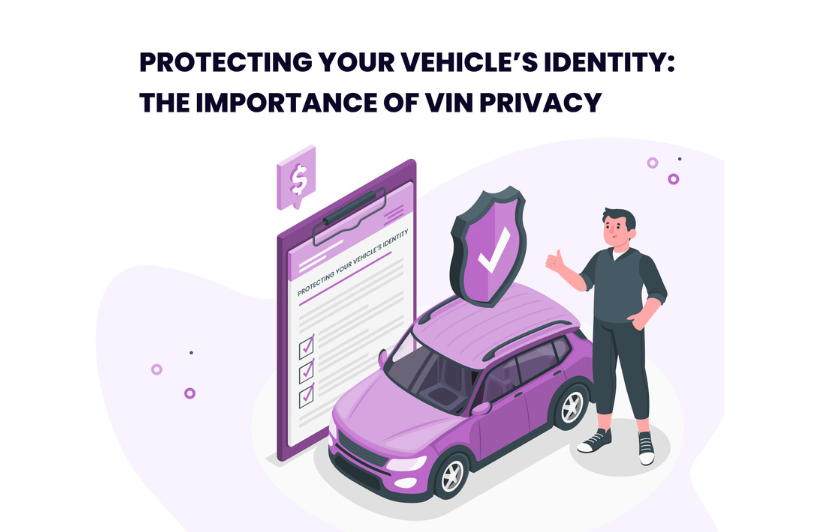Your vehicle identification number (VIN) holds a wealth of data about your car’s history, including ownership records, past accidents, and service records. While this information can be useful for potential buyers, it also poses risks by exposing sensitive information in public databases. That’s why maintaining privacy and knowing how to delete VIN history is essential for many vehicle owners. With Stat VIN, you can take control of your data, ensuring a clean history and protecting your vehicle’s resale value. In this article, we’ll explore why VIN privacy matters, how deleting VIN history works, and the benefits of securing your vehicle’s records.
What is a VIN and Why is it Important?
A Vehicle Identification Number (VIN) is a unique 17-character code assigned to every vehicle. It serves as a fingerprint, containing essential details such as the manufacturer, model, production year, and place of origin. The VIN structure is standardized worldwide, ensuring accurate identification across different regions.
This unique code plays a crucial role in vehicle identification. Authorities use it for registration and insurance, while service centers rely on it to track maintenance records. Additionally, potential buyers check a vehicle’s VIN to verify its history, including past accidents, ownership records, and service logs.
Because a VIN is linked to public databases, it can expose sensitive information about a vehicle’s history. This makes VIN privacy a growing concern for vehicle owners who want to protect their data and maintain control over their car’s history.
How Your VIN Can Reveal Personal Data
Your vehicle identification number (VIN) is more than just a code—it’s a key to a vast amount of sensitive information about your car’s history. By checking a vehicle’s VIN, one can access ownership records, mileage, past accidents, repairs, and service history. This data is stored in public databases and is often used by insurance companies, dealerships, and government agencies.
However, the accessibility of VIN records poses privacy concerns for vehicle owners. Misinformation or errors in a vehicle’s history report can affect its resale value or even lead to legal issues. Worse, fraudsters may exploit VIN data for identity theft, vehicle cloning, or fraudulent sales. Protecting your VIN history and knowing how to delete car history is essential for maintaining privacy and preventing unauthorized access to your vehicle’s records.
Exposing your vehicle identification number (VIN) can lead to serious security and privacy risks. Fraudsters use VIN cloning to create fake documents for stolen cars, making them appear legitimate. They take a valid VIN from a legally owned vehicle and assign it to a stolen car, allowing them to resell it without raising suspicion.
Another threat is car theft through VIN manipulation. Criminals can use publicly available VINs to create duplicate keys or forge ownership documents, enabling them to steal vehicles without physical access. Additionally, personal data linked to a vehicle’s VIN, such as ownership records and service history, can be sold to third parties, compromising the owner’s privacy.
To avoid these risks, vehicle owners should consider deleting VIN history from public databases. This helps protect against fraud, identity theft, and unauthorized access to sensitive information.
Who Has Access to Your VIN Data?
Your vehicle identification number (VIN) is not just a random sequence of numbers—it’s a digital fingerprint that many entities can access. Government agencies such as DMVs, law enforcement, and tax authorities use VINs for registration, crime investigation, and taxation purposes.
Beyond official institutions, private companies also have access to VIN records. Car dealerships, insurance providers, repair shops, and auction houses use this data to verify a vehicle’s history, assess risks, and determine resale value.
Additionally, numerous public VIN databases store and distribute vehicle history reports. While some platforms claim to have secure data protection, many records are easily accessible, raising concerns about unauthorized access. This is why many vehicle owners choose to delete VIN history to prevent misuse of their car’s past records and protect their personal privacy.
How to Protect Your VIN and Maintain Privacy
Protecting your vehicle identification number (VIN) is essential for preventing fraud and safeguarding sensitive information. One of the most effective ways to maintain privacy is to limit public exposure. When selling a vehicle online, avoid posting clear photos of the VIN to prevent fraudsters from misusing the data. If sharing images, consider blurring or covering the VIN to reduce the risk of vehicle cloning or identity theft.
Additionally, vehicle owners can request VIN data removal from public databases. Many services allow you to submit a request to delete car history, ensuring that accident records, ownership details, and service logs remain private. Professional services specializing in deleting VIN history can guide you through the step-by-step process of removing this data, helping to prevent unauthorized access and maintain control over your car’s history.

Services like HideAutoVin provide vehicle owners with an effective way to protect their VIN history from public exposure. By offering VIN data removal, they help prevent unauthorized access to accident records, ownership history, and service logs. This is especially valuable for those looking to maintain privacy and secure their vehicle’s resale value.
Using professional VIN deletion services ensures that sensitive information is removed from public databases, reducing risks like identity theft, fraud, or misuse by third parties. Additionally, these services operate within legal frameworks, allowing vehicle owners to control their data while complying with local regulations.
While deleting VIN history is a personal choice, it serves as a legitimate method to prevent unauthorized access to vehicle records. With HideAutoVin, users can take proactive steps to protect their car history and ensure their data remains private.
Future Trends: The Growing Importance of VIN Privacy
As data privacy regulations evolve, the importance of VIN protection is gaining more attention. Governments and regulatory bodies are tightening data security laws, requiring better control over how vehicle history records are stored and accessed. This shift aims to reduce the risks of fraud, unauthorized tracking, and personal data exposure.
New technologies, such as blockchain-based vehicle records and enhanced encryption methods, may offer better security for VIN data. These innovations could prevent unauthorized access while still allowing legitimate users, like car owners and dealerships, to verify vehicle history safely.
For vehicle owners, staying informed about data protection laws and using services to delete VIN history are crucial steps. As public databases become more regulated, taking proactive measures—such as limiting VIN exposure and working with professional VIN deletion services—can help ensure long-term data privacy and security.
Conclusion
Protecting your vehicle identification number (VIN) is essential for safeguarding personal data and preventing fraud. Public access to VIN records can expose ownership history, accident reports, and service logs, leading to potential privacy risks.
To maintain security, vehicle owners should limit VIN exposure, remove data from public databases, and use professional VIN deletion services like HideAutoVin. Taking these steps helps ensure a clean vehicle history, protects against unauthorized access, and enhances data privacy in an increasingly digital world.





